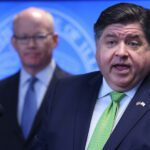[ad_1]
It is easy, and probably correct, to call Gov. Kathy Hochul a coward. By delaying, indefinitely, the implementation of congestion pricing, she has blown a hole in the Metropolitan Transportation Authority’s capital budget and harmed the environment to possibly aid a few Democrats running in congressional races beyond the five boroughs. There is no serious policy justification for scuttling the far-reaching tolling scheme just weeks from implementation — not when the state already appears on the hook for the $500 million in cameras and other equipment installed around Manhattan.
Hochul plainly panicked. Congestion pricing isn’t polling well, and Hakeem Jeffries, the House minority leader and a Brooklyn power broker, would prefer his top Democrats in the Hudson Valley and on Long Island don’t hear attacks from Republicans about how anti-automobile the Democratic Party has become. The $15 toll for vehicles south of 60th Street was spooking certain business interests and riling up commuters in both parties. Better to scrap it, they figured, until at least after November — or kill it altogether.
Hochul’s proposed replacement for the $1 billion in annual revenue the MTA was going to pump into its budget is a business tax on New York City, which would still have to pass the Democrat-run legislature. This would alienate city interests at the expense of the suburbs. There’s no guarantee, with only a few days left in the legislative session, Democrats will approve this kind of tax.
What’s most absurd about Hochul’s announcement is that she made it now. She had spent months defending congestion pricing, talking up its environmental benefits and its ability to generate revenue for mass transit upgrades. While there are people in the outer boroughs and suburbs who need to drive into Manhattan, most commuters don’t. The subway, bus and commuter rail system is extensive. It should be utilized to its full potential.
But it became clear that Hochul, who has sidled closer to the Biden administration as she seems to cultivate her own national ambitions, was never overly enthusiastic about tolling cars to enter Manhattan. Her predecessor, Andrew Cuomo, had rubberstamped the legislation in 2019, and Hochul didn’t seem to enjoy the years of lawsuits, delays and furious opposition from Long Island and New Jersey politicians, especially Gov. Phil Murphy, a fellow Democrat.
Hochul and the MTA failed in several crucial ways to sell congestion pricing. They never explained it well to the public — that it would, over time, make public transportation better. In particular, they never paired it to specific projects. They could have reasonably promised new bus, subway or commuter rail lines.
Outer borough neighborhoods without adequate subway service felt left out. If you’re in eastern Queens, your only option to reach the city is bus service or, in certain cases, the Long Island Rail Road. A $15 toll would be genuinely discouraging and lead to fewer trips to Manhattan’s core.
This problem could have been solved if the MTA promised not to double-toll. There was a small discount offered if a commuter already paid a Hugh Carey or Holland Tunnel toll, but the congestion fee was never waived entirely. It never made much sense that a driver had to pay a tunnel toll and a congestion pricing fee. Why not reserve the congestion pricing tolls for those who hadn’t paid to cross through a toll tunnel?
In truth, Cuomo and the legislature botched an opportunity to put forth a more equitable tolling scheme proposed by “Gridlock” Sam Schwartz and other transportation advocates a decade ago. The proposal, then, was to add tolls to the free outer borough bridges while reducing them on other bridges that were already tolled, like the Verrazzano. This assuaged the concerns of those coming from Staten Island or the Bronx who feared paying multiple tolls just to reach Manhattan. Staten Islanders still don’t have a link to the subway system.
The messaging was forever muddled. Was congestion pricing intended to improve air quality or raise cash for the MTA? The MTA does have a very poor track record when it comes to efficiently spending public money on transportation projects. The first phase of the Second Avenue Subway was extraordinarily expensive, and the MTA has not figured out, like transportation agencies in Europe and Asia, how to build new train lines without soaring budgets. Arguments for additional MTA revenue always run up against this uncomfortable truth.
Covid, too, was a complicating factor. Hochul deserves censure, but she’s right that it’s not 2019 anymore. If the city has largely recovered from the pandemic, there are parts of Midtown and downtown Manhattan that have never quite bounced back. Business owners fretted losing outer-borough and suburban commuters who may have foregone car trips to comedy clubs, Broadway shows and pricey dinners.
Hochul should have pressed forward with congestion pricing because, over time, it would have grown more popular, as was true in London. Commuters would have adjusted to the reality, and the MTA would have more money. Instead, the future is murky, and the most powerful politician in New York appears to have little idea of what needs to be done.
Ross Barkan is a writer and author in New York City.
[ad_2]
Ross Barkan , 2024-06-05 23:44:36
Source link


